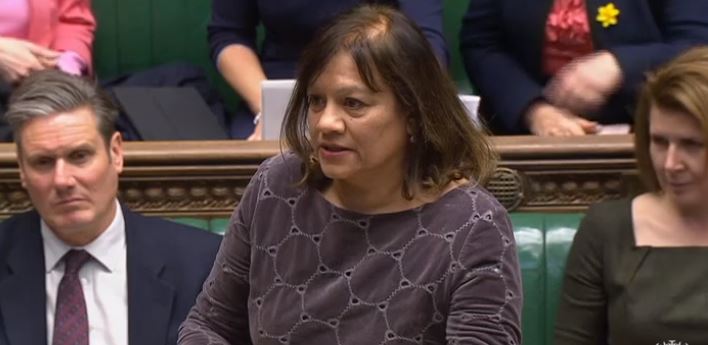- 27/03/2019
- Posted by: Valerie Vaz MP
- Category: News

On 25 March 2019 Parliament voted by a majority of 27 votes (Ayes: 327, Noes: 300) to support an amendment brought by Sir Oliver Letwin MP to hold a series of indicative votes on 27 March 2019. The Government sought to block indicative votes on 27 March 2019 and was again defeated, this time by a majority of 44 (Ayes: 331, Noes: 287). I voted in favour of indicative votes owing to the Government’s failure to seek consensus across Parliament on a way forward.
This was a new process for Parliament, indicative votes are a means of testing the will of the House of Commons on different options relating to one issue. After each motion was debated the House was suspended from 7-7.30pm as MPs used ballots voting papers to declare their prefered Brexit solutions. At 9.40pm the Speaker announced the results of the indicative votes.
On Wednesday 27 March 2019, I responded to the Business of the House motion that set out the framework for the debate on indicative votes on various Brexit-related motions. I took a series of interventions. You can exerts from my speech below:
Members have mentioned that the House is listening and that the Prime Minister is listening. The Prime Minister has met hon. Members, but she has not listened to them. The fact is that we are in unusual times. This is a hung Parliament, and the Government are governing on the basis of a confidence and supply agreement and nothing else.
On the question of whether the withdrawal agreement can be amended, I have sitting beside me the shadow Secretary of State for Exiting the European Union, my right hon. and learned Friend the Member for Holborn and St Pancras (Keir Starmer), who has been in discussions with the European Union. We have been in the European Union for more than 40 years, and we know that it would be open to any discussions, such as those that it has held with my right hon. and learned Friend, if that was what was decided. We cannot ignore what our constituents—people of all generations—said to us when they took time out last weekend to tell Parliament exactly what was going on.
The point about precedent is really important. None of our rules or procedures is set in aspic. In my working life as a lawyer, I have seen the civil procedure rules turned over. We move forward; we do not look back. With the greatest respect to the hon. Member for North East Somerset (Mr Rees-Mogg), even “Erskine May” is updated.
The House is only responding today to what it agreed on Monday. Let us face it: we would not have had the first meaningful vote if the House had not agreed to it, and we had to struggle to get it. Speaking of the meaningful votes, the first was lost by 68% to 32% and the second by 62% to 38%.
These are unusual times. Nobody asked the then Prime Minister to resign after the referendum vote, but he did nevertheless and a new one had to be found. We are in difficult and unusual times. This is one of the biggest issues of the day, and it will not affect the majority of hon. Members here, but it will affect our children and our grandchildren and future generations.
Let us face it: Europe kept the peace in Europe, where some terrible things had happened. I keep saying that the reason why we have the Human Rights Act is because single human right was breached during the last war. Europe has moved on from that sort of forum into one whereby we trade with our biggest and nearest partners, and that is why we have a Union that more states want to join. For the sake of future generations, we need to think carefully about what we do today. This is about the will of the House. The House decided that there was a vacuum and the House filled that vacuum. Hon. Members from all sides wanted to move forward constructively, and that why we are in this position today.
We have had to learn from a certain social media platform that there may be a vote on Thursday, or maybe Friday. Is that the way to conduct responsible government? The Opposition would say no. No one from the Government has had the courtesy to come here—I do not know whether they have informed you, Mr Speaker, but they certainly have not informed us—to say what is going to happen with business on Thursday and Friday, yet people outside do know.
We are trying to help the Government, which is why we need to support these indicative votes today. We are trying to help the Government find out exactly what hon. Members want and do not want. The Opposition support the motion, and we want to find a way forward.

